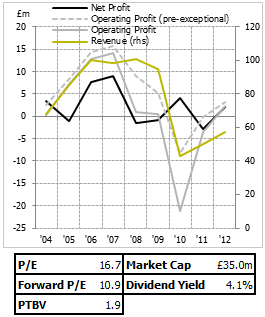 Vislink (LON:VLK) has been recommended to me by a few different people now and mentioned by a couple of bloggers (I know Pauly Pilot is keen and I've a hunch there's someone I've forgotten..), so I thought I better check it out. The offer of a value opportunity shouldn't be refused! I usually start with a sentence of two detailing what the company I'm looking at does, but recently I've been having a bit more trouble with this. It's easy, as a layman, to understand how a company makes money renting vans or building houses. I don't find it quite as easy to unravel exactly where companies sit in a supply chain that isn't pointed towards me as an end-user, though; I'm no expert on the assembly of engines and other goods, for instance, and so the market dynamics are a bit more complicated. Bear that in mind when I talk about Vislink, then, because they occupy a rather lofty position - they provide broadcast solutions for some of the world's most recognisable events.
Vislink (LON:VLK) has been recommended to me by a few different people now and mentioned by a couple of bloggers (I know Pauly Pilot is keen and I've a hunch there's someone I've forgotten..), so I thought I better check it out. The offer of a value opportunity shouldn't be refused! I usually start with a sentence of two detailing what the company I'm looking at does, but recently I've been having a bit more trouble with this. It's easy, as a layman, to understand how a company makes money renting vans or building houses. I don't find it quite as easy to unravel exactly where companies sit in a supply chain that isn't pointed towards me as an end-user, though; I'm no expert on the assembly of engines and other goods, for instance, and so the market dynamics are a bit more complicated. Bear that in mind when I talk about Vislink, then, because they occupy a rather lofty position - they provide broadcast solutions for some of the world's most recognisable events.
There's lots of pictures on their site of Vislink systems at F1 and football matches, for instance, or on news helicopters - and after some digging I ascertained (again, as someone completely uneducated in how the pictures on my television arrive at that television) that their equipment, and expertise, is essentially focused on the wireless transmission of that video/sound data from the point of capture to where it needs to be next down the chain of production. They talk about being 'first on the market' with practical digital wireless cameras, for instance, and they seem on the ball with new developments in growing markets - mobile news coverage, for instance. I can see how they make money - they're an integral piece of a huge market, with wide-ranging applications. They talk about the growing surveillance segment, for instance.
They're hardly small players, either. According to management, they hold what they think is about 20% of the global addressable broadcast market - a market that, they note (and I wouldn't dispute) is growing, particularly on other continents, with the shift to HD in Europe and the US and from analog to digital in other parts of the world. At first glance, this seems…

.png)



